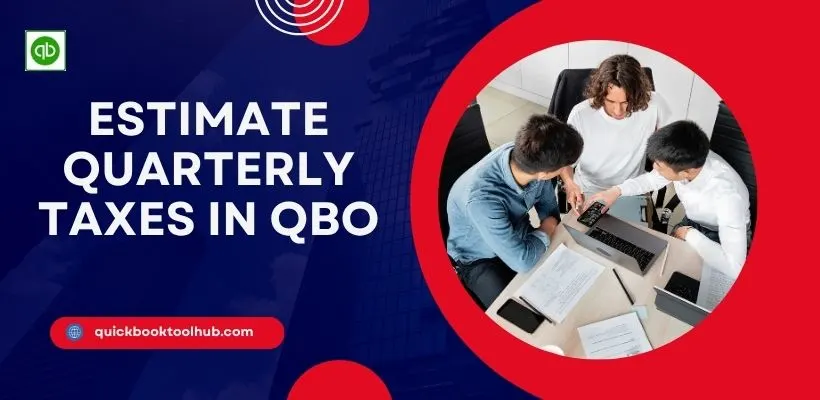
Estimate Quarterly taxes in QBO makes compliance with IRS requirements to helps self-employed individuals and small businesses. QBO simplifies estimated taxes by automatically calculating the process based on your income, expenses, and deductions. By making it easier to avoid underpayment penalties in real-time you can track your earnings and tax obligations. To make quarterly tax payments, direct links and reminders are provided by QuickBooks Online Accountant or QBO self-employed. To keep the financial records accurately, it ensures you to be organized and up-to-date throughout the year.
In this blog, we will discuss estimated quarterly taxes in QBO as well as the major similarities and differences. As well, who needs to pay, and how quarterly taxes work, are also discussed. We will provide you with some major points about the accounting software to help you make the proper selection which one needs.
Overviews of Estimate Quarterly Taxes In QBO
QuickBooks Online (QBO) suggests an oversimplified solution to manage the quarterly estimated taxes, ideal for freelancers and self-employed individuals. Throughout the year it calculates accurate tax estimates to track income and expenses automatically. Due dates and payment amounts are both included by the taxes tab in QBO. Estimate quarterly taxes in QBO also helps you to stay on schedule and avoid penalties by sending reminders. QBO manages their estimated tax payments year-round by helping the users to stay organized and maintain compliances.
Who Demands to Pay Estimated Quarterly Taxes In QBO?
Actually, those who do not have the permission to withhold their taxes automatically from their income are only required for individuals and businesses to Estimate Quarterly Taxes In QBO. Small business owners, self-employed individuals, and freelancers are also included in this. If you are looking forward to owing at least $1000 in federal taxes for the whole year after subtracting your credits, then you have to pay the estimated taxes. The estimated payments are also required for works by the incomes of interest, capital gains, and dividends. It helps the quarterly payments in making it timely by avoiding the IRS.
How Estimated Quarterly Taxes In QBO Work?
Estimate quarterly taxes in QBO are the estimated payments that are made for work as four times in a year to cover the income tax and self-employment tax, as they applied on its income to withhold not for the subject. These payments basically depend on the projected annual earnings and help to avoid penalties by the IRS throughout the year.
Here are some steps for paying Estimate quarterly taxes in QBO works are mentioned below:
- Hw much you earn for the year that will estimate your annual income.
- Use the IRS form to calculate the 1040-ES estimating taxes.
- Divide all the total dues of tax into four payments evenly across the year.
- Complete the payments by IRS deadlines or due dates.
- Track the income charges and make it up-to-date to adjust if needed.
Tracking Estimated Tax Payments in QBO
By making the payments of estimated quarterly taxes in QBO, that makes sure the accurate records and simplifies the taxes in time. The system automatically calculates and tracks your estimated taxes, which are based on your income and expenses, and is available in QBO Self-Employed. Including your past and upcoming payment amounts can be viewed by your quarterly tax obligations, which are under the taxes tab. To maintain accurate records, while you are making a payment in QBO, make a record of it as quickly. It ensures your reports reflect the true profit and reduces the risk of penalties for underpayments.
Using TurboTax with Estimated Quarterly Taxes In QBO
The process of estimating and filing taxes is simplified by using the TurboTax with Estimate Quarterly Taxes In QBO. TurboTax was perfectly integrated in the QBO by allowing you to make your income import, expenses, and deduct it directly into your taxes. This helps all the data entry and reduces the risk of errors being extracted. It uses the accurate information to calculate the estimated taxes from QBO and also to guide you by making the payment requirements. You can make it track to see your payments situation. It saves time and improves the accuracy for your self-employment or tax responsibilities.
Advice for Managing Estimated Quarterly Taxes In QBO
Organization and proactive planning are more effectively required for managing the Estimate quarterly taxes in QBO. By setting the percentage of your income, you can start to avoid every last-minute stress for taxes each month. In real time, to track the QuickBooks Online (QBO), it uses accounting software like income, expenses, and deductions. If your income has changed while reviewing your financial records, it ensures accurate estimates and adjusts the payments. Set a reminder and highlight the IRS due dates on your calendars to adjust.
Frequently Asked Questions
Can we track the estimate quarterly taxes in QBO?
Yes, you can track the estimate quarterly taxes in QBO very easily by automatically calculating the incomes and expenses.
Can the Estimate Quarterly taxes be managed?
Of course, the estimate quarterly taxes can be managed by some tips which have been discussed above in the blog, you can check it out.
Would we make the turbo tax useful for QBO?
Yes, we can use the turbo taxes for QBO by the process of estimating and filing the taxes which are simplified.
Conclusion
In the end, we conclude that estimate quarterly taxes in QBO are a smart way to stay on your tax obligations if you are self-employed to earn income without withholding. It simplifies the process by calculating the estimated taxes automatically, which are based on the income and expenses of real-time. To track the payments and set the reminders in TurboTax with the help of built-in tools to make sure that the records are organized and complaints. With the help of QBO for quarterly taxes, it reduces the risk of IRS penalties and makes an improvement in financial accuracy.


